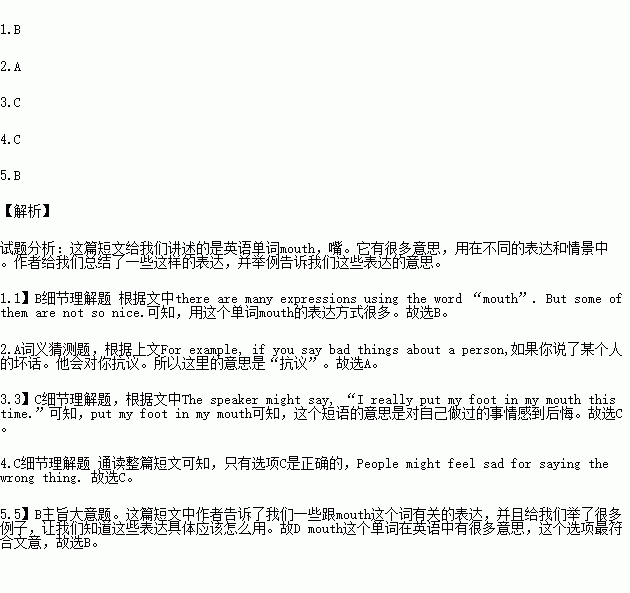题目内容
People use their mouths for many things. They eat, talk, shout and sing. They smile and they kiss. In the English language, there are many expressions using the word “mouth”. But some of them are not so nice.
For example, if you say bad things about a person, the person might protest and say “Do not bad mouth me.”
Sometimes, people say something to a friend or family member that they later regret because it hurts that person’s feelings. Or they tell the person something they were not supposed to tell. The speaker might say: “I really put my foot in my mouth this time.” If this should happen, the speaker might feel “down in the mouth.” In other words, he might feel sad for saying the wrong thing.
Another situation(情况)is when someone falsely claims (宣布)another person said something. The other person might protest: “I did not say that. Do not put words in my mouth.”
Information is often spread through “word of mouth.” This is general communication between people, like friends talking to each other. “How did you hear about that new movie?” someone might ask. “Oh, by word of mouth.” A more official way of getting information is through a company or government mouthpiece(发言人). This is an official spokesperson. Government-run media could also be called a mouthpiece.
1.In the English language, there are many __________using the word “mouth”.
A. words B. expressions
C. pictures D. ideas
2.What is the meaning of the underlined word “protest” in Chinese?
A. 抗议. B. 咒骂. C. 同意. D. 辩驳
3.If someone tells the person something that he/she was not supposed to tell, the speaker might say:
“___________________”
A. Do not bad mouth me.
B. I did not say that.
C. I really put my foot in my mouth this time.
D. Oh, by word of mouth.
4.Which of the following is TRUE according to the passage?
A. All expressions using the word mouth are nice.
B. People don’t use mouth to smile.
C. People might feel sad for saying the wrong thing.
D. Getting information through a company mouthpiece is not an official way.
5.What is the passage mainly about?
A. The use of mouth.
B. Some expressions about mouth.
C. The word “mouth”.
D. All expressions about mouth.

